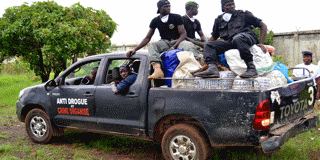West Africa’s Failed War on Drugs
To commemorate its founding 25 years ago, PS is republishing a selection of commentaries written since 1994. In the following commentary, Olusegun Obasanjo argued that, to reduce the harm caused by the illegal drug trade while maintaining access to essential medicines and services, governments must stop punishing addicts.

LAGOS – No matter where you look in West Africa, drug laws are failing. Despite tough sentencing guidelines and zero-tolerance policies, drug use is increasing, while drug traffickers operate with impunity. As the late Kofi Annan once wrote, “Drugs have destroyed many lives, but wrong government policies have destroyed many more.”